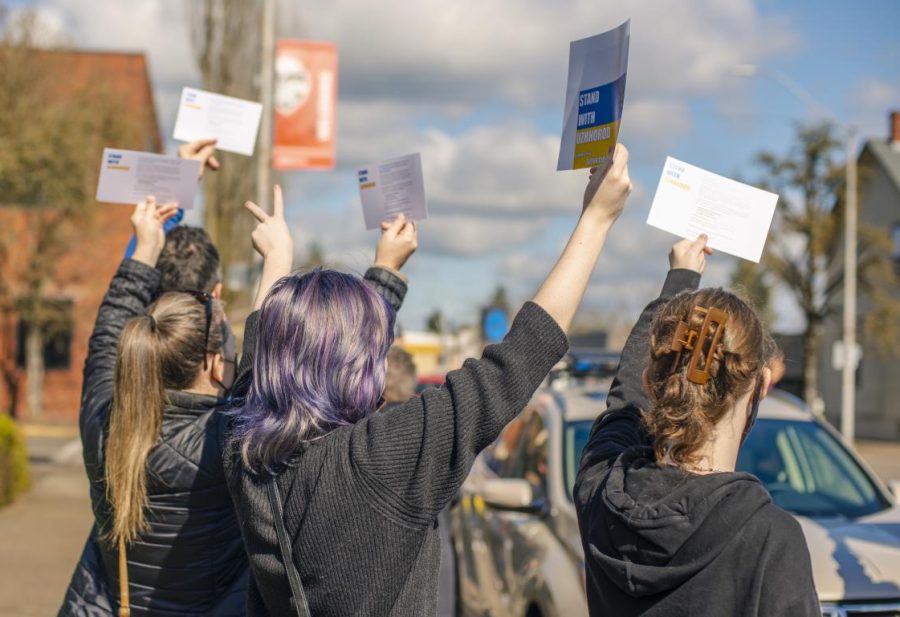OSU ‘committed to providing care and support’ for students impacted by Russia-Ukraine war
Jess Hume-Pantuso, Photographer
Young protestors display their signs at a Ukraine protest at the Benton County Courthouse in Corvallis, Ore. on March 5. According to Grace Atebe, director of the Office of International Services, Oregon State University wants to help all those in the university community who have been impacted by the Russian-Ukrainian war.
April 21, 2022
Oregon State University and the Office of International Services are working to support students affected by the Russia-Ukraine war.
Dan Larson, vice provost for student affairs, said OSU is working to provide support and resources to impacted students so they can continue with their academic work.
“OSU is committed to working with members of our community who are impacted by the unfolding events in Eastern Ukraine,” Larson said. “We recognize this is an immensely stressful time.”
Grace Atebe, director of OIS, said, “OSU is committed to providing care and support for all those within the university community impacted by the war in Ukraine.”
Atebe said OSU is doing what they can to lessen the impact to academic progression by arranging pre-payments for tuition to avoid issues with currency devaluation and international transactions, as well to address registration holds for spring term and beyond. The Student Care Team from the Office of the Dean of Students is also providing resources to students who may require assistance with expenses for housing, books and other supplies.
“Students expressed concerns around their families’ wellbeing and financial challenges due to the disruption of income for their families, devaluation of their currency, as well as sanctions which impacted international financial transactions,” Atebe said. “Some Russian students also expressed concerns around the potential for bias incidents.”
According to Atebe, OIS is not aware of an increase in bias incidents against Russian students.
Atebe said affected students have also been connected to Student Health Services, Counseling and Psychological Services, Bias Incident Reporting, Human Services Resource Center and more, along with being provided with the space and opportunity to gather in support of each other. She said some academic colleges organized open forums concerning global affairs and University Relations and Marketing provided avenues for students to share personal perspectives and opinions with local media.
Atebe said there is no indication that prospective OSU student applications or attendance will be impacted. The Office of International Admissions is working directly with applicants and supporting them through the application process.
“OIS continues to work directly with students to address immigration-related impacts,” Atebe said.
According to Atebe, eligible students who apply to and get approval from United States Citizenship and Immigration Services are legally permitted to stay in the U.S. for up to 18 months. These students may also apply for employment authorization in the U.S. which permits them to work off campus. The Associated Students of OSU Legal Services, as well as other immigration services in the community, can assist students working with the U.S. immigration service.
Atebe said OSU students can help support their Ukrainian and Russian peers and community members by showing understanding and empathy, maintaining awareness of the events in Ukraine via non-partisan sources and donating to trustworthy humanitarian organizations.
The Russian Speaking Students Club was not available for comment.










































































































